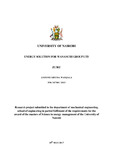| dc.description.abstract | Power supply is one of the critical challenges confronted by telecommunications operators in
deploying their networks. This challenge is readily overcome in developed countries as a
result of up-to-date power infrastructure. In the developing world, where a national electricity
grid is unreliable, providing dedicated, reliable low-cost power supply for base station sites is
very challenging.
This dissertation focuses on the development of a hybrid energy system for the base stations
of Wananchi Group (k) Ltd (Zuku) in order to provide uninterrupted power supply to satisfy
minimum requirements of Quality of Service (QoS), and reduce the increasing cost of energy
per kWh. Various energy sources for telecommunications have been discussed in the report
which have been categorised as off grid sites and on grid sites , that includes wind power,
solar, fuel cells and a combination of either which the advantages and disadvantages of each
source highlighted.
Real historical data was collected that included, monthly kplc meter readings and bills,
generator operation and maintenance cost and monthly fuel consumption from the submitted
delivery notes and invoices. Currently the problem of poor electricity supply experienced is
being resolved by diesel generators. These generators, however, are associated with many
problems, which include, among others, noise pollution emanating from the generators and
environmental pollution. Diesel generator exhaust contains harmful hydrocarbons in the
atmosphere during operations. Operation and maintenance is costly, and typically accounts
for 32 percent of the total cost of ownership (TCO)
Hybridizing diesel with renewable energy sources (solar power) is one method of reducing
operational cost and improving the service in terms of powering base station sites. This will
allow Zuku to circumvent rising energy costs and receive an excellent Return on Investment
(ROI), with a payback period of 1.8 years.
It will also make communications more accessible and reduce the environmental impact. A
hybrid power system is therefore proposed to solve these aforementioned problems. PVstyt
simulation software was used in the design, simulation, technical and financial analysis of the
proposed energy solution | en_US |



